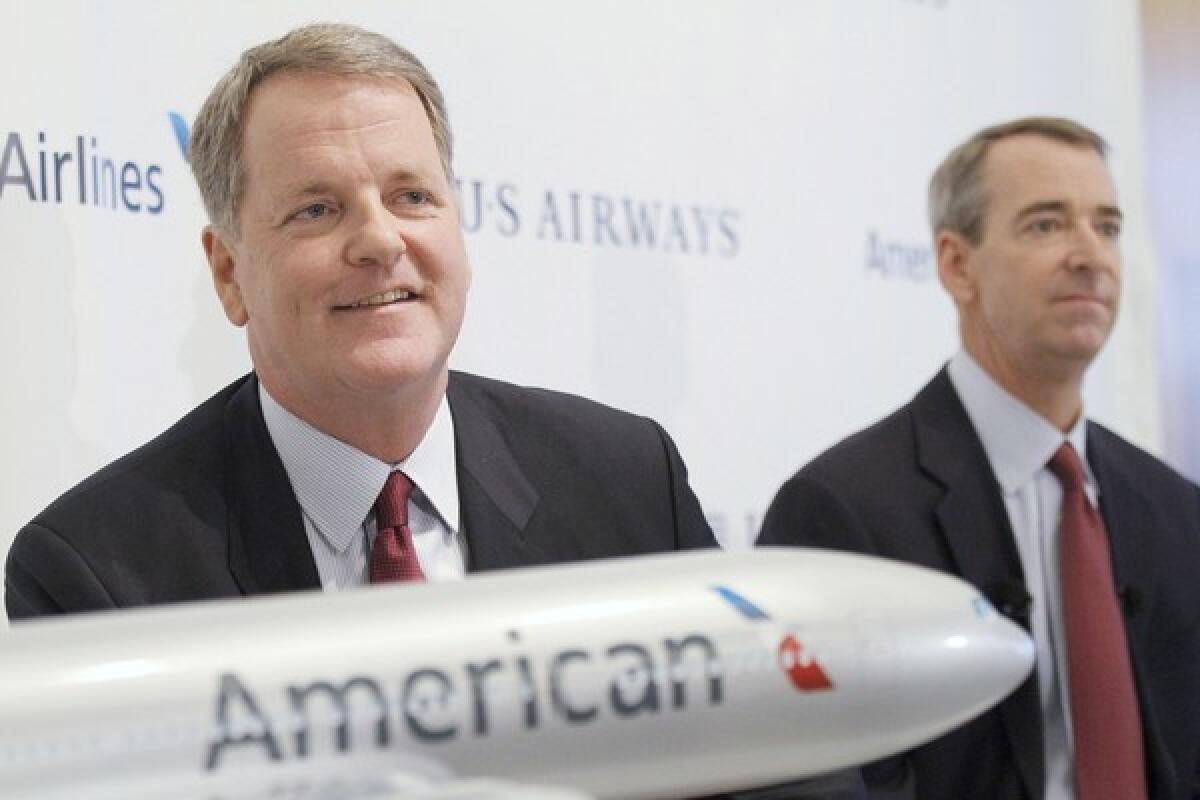U.S. antitrust suit sheds light on US Airways business practices

- Share via
The Justice Department on Tuesday filed an antitrust suit seeking to block the merger of US Airways and American Airlines, but buried inside the complaint is some internal correspondence by US Airways executives, including Chief Executive Doug Parker, that shed light on some of US Airways’ business practices.
Also, the two companies said in a joint statement that they will “mount a vigorous and strong defense to the U.S. Department of Justice effort to block” the merger.
“We believe that the DOJ is wrong in its assessment of our merger. Integrating the complementary networks of American and US Airways to benefit passengers is the motivation for bringing these airlines together. Blocking this pro-competitive merger will deny customers access to a broader airline network that gives them more choices,” the statement said.
The U.S. government, however, sees it another way.
The lawsuit it filed was partly based on internal communications between executives at US Airways on their own analysis of the proposed merger. The following exchanges were contained in the Justice Department’s complaint:
On offering in-flight wireless Internet:
In a 2011 email exchange, one senior executive groused about the need to install in-flight wireless Internet.
He wrote: “[N]ext it will be more legroom. Then industry standard labor contracts. Then better wines. Then the ability to book on Facebook. Penultimately, television commercials...”
US Airways Chief Executive Doug Parker wrote back: “Easy now. Consolidation will help stop much of the stupid stuff but inflight internet is not one of them.”
On a rival’s aggressive maneuvers to compete:
In 2010, a competing, unnamed airline extended a “triple miles” promotion, which set off a chain of emails within US Airways, according to the complaint. The lawsuit also said that the airline was expanding service.
According to the complaint, Parker sent an email to other senior executives about how to counter that rival airline’s maneuvers:
They “are hurting [the rival airline’s] profitability – and unfortunately everyone else’s,” he wrote.
Those executives exchanged several emails debating how to get the attention of the rival airline, including portraying “these guys as idiots to Wall Street and anyone else who’ll listen.”
Eventually, Parker forwarded the email chain full of messages to the chief executive of the rival airline, the Justice Department said.
On ending US Airways’ Advantage Fares program, which offers lower fares on some routes:
One of the major points raised in the Justice Department complaint is that US Airways had competed with American and other carriers on certain routes by offering discounted fares.
Under its Advantage Fares program, it offered cheaper fares but on routes that included at least one stop. Other carriers offered nonstop fares for those routes, but for much higher prices.
According to an October 2012 internal analysis cited in the complaint:
The Advantage Fares “program would have to be eliminated in a merger with American, as American’s large non-stop markets would now be susceptible to reactionary pricing from Delta and United,” the analysis said.
On whether to raise a second checked bag fee to $100 to match Delta’s price:
One executive, in an undated exchanged, mulled whether US Airways could do the same:
“Wow -- $100 is a lot for second bag. I would think there’s big passenger gag reflex associated with that, but if we can get it, we should charge it,” the complaint said.
On whether to match other airlines’ fee increases for checked bags:
According to the complaint, in July 2009 American Airlines raised its checked bag fee to $20. Other airlines had a Web-only discount for $5 off checked bag fees. The decision for US Airways, according to the complaint, came down to either eliminating their Web discount or raise their fee to $25 and offer the $5 discount.
“I can’t believe I’m saying this, but I think we should stand still on this for now. I recognize that increases the chances of everyone standing still . . . the [dollars] aren’t compelling enough for us to stick our necks out first. I do think D[elta] or U[nited] won’t let them have an advantage, so it’ll get matched – I’m just not sure we should go first. If a couple weeks go by and no one’s moved, we can always jump in,” Parker said
On Southwest’s policy of not charging for a first checked bag:
In late 2011, a senior US Airways executive wrote about Southwest’s policies and why US Airways does not follow suit:
“Our employees know full well that the real competition for us is [American], [Delta], and [United],” according to the complaint. “Yes we compete with Southwest and JetBlue, but the product is different and the customer base is also different.”
On a failed 2007 bid by US Airways to acquire Delta Airlines:
The Justice Department complaint mentions an exchange between US Airways chief executive and investors following the scuttled deal. If the deal had been successful, it would have reduced capacity and increased revenues.
“It’s part of what we tried to impress upon people as we were going through our run at Delta, was that . . . it was good for US Airways [and] good for the entire industry. We’re going to take out 4% of the industry capacity as we did that. Everyone’s 2008 numbers would look ... a lot better had that transaction happened.”
ALSO:
Ackman out at J.C. Penney after spat over CEO, chairman
Edison tells customers they should pay for San Onofre shutdown
O.C. lender CashCall scammed borrowers, N.Y. attorney general says
More to Read
Inside the business of entertainment
The Wide Shot brings you news, analysis and insights on everything from streaming wars to production — and what it all means for the future.
You may occasionally receive promotional content from the Los Angeles Times.











